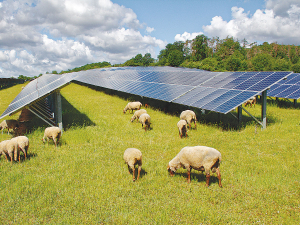Another solar farm on the cards
Solar generation company, Lodestone Energy is partnering with Haldon Station, located in the heart of the Mackenzie District, to build and operate a 220 MW utility-scale solar farm.
 Solar farms provides farmers with the opportunity to diversify income while continuing to graze livestock.
Solar farms provides farmers with the opportunity to diversify income while continuing to graze livestock.
A local energy company is working with NZ farmers wanting to combine grazing livestock with hosting solar farms on their land.
Harmony NZ builds owns and operates wind, solar and battery energy storage assets to create renewable energy systems. It has successfully developed renewable projects across multiple technologies throughout the UK. Recently the company recently was granted approval to fasttrack its application for a solar farm in the Waikato, which could generate enough electricity to power 30,000 homes.
Harmony director Pete Grogan says solar farms allows for continued pasture growth, providing farmers with the opportunity to diversify income while continuing to graze livestock. He adds that earthworks are limited and construction is straightforward so disruption for farmers can be kept to a minimum.
"Flat or gently rolling/sloping land with good exposure to sunlight is important," Grogan explains. "As is being close to existing high voltage grid structure."
He says the company also select areas that are away from towns and urban settings to ensure their solar farms have low visual impact.
"There are a limited number of areas that meet these criteria - so this could be a real opportunity for those that do."
Harmony's new project at Tauhei Farms - at Te Aroha, West in the Waikato, will see 329,000 panels constructed on 182 hectares of a 260 hectare site. The company has been granted approval to fast-track its application for the solar farm under the Covid-19 Recovery (Fast-Track Consenting) Act 2020.
Phillip Dibble, a spokesman for Tauhei Farms, says the panel array separation and height above ground will allow for continued pasture growth. He says it has the added benefit of shade and shelter for the sheep that will be grazed at the site.
"All solar panels and other equipment would be significantly set back from surrounding roads," Dibble explains. "All the electricity generated by the panels will flow directly into the national grid for use by homes and businesses."
He believes it's a great option for farm businesses looking to diversify.
"We're proud to be supporting New Zealand's shift to renewable energy."
Grogan adds that renewable energy is critical to mitigate the impact of climate change and help to support New Zealand's net zero ambitions.
"Our solar farms reduce the need to generate energy from non-renewable sources and will contribute significantly to New Zealand's international climate change commitments," he adds.
"Allowing dual land use and combining energy generation with continued farm production is a real benefit of solar power.
Former Fonterra executive Alex Turnbull has been appointed CEO to lead all five Yili Oceania Business Division companies in New Zealand.
Fonterra executive René Dedoncker is leaving the co-operative later this year to lead Australian agribusiness Elders.
Alliance Group and the Southland Stags rugby team have joined forces in a partnership that will see the the meat co-operative's farmgate brand feature on players' team kits and replica jerseys.
Fonterra's plan to expand its organic programme to the South Island is being well received by farmers, the co-op says.
Voting has started for the renewal of DairyNZ's milksolids levy.
The most successful catchment groups in NZ are those that have 'a source to sea' approach.

OPINION: Here w go: the election date is set for November 7 and the politicians are out of the gate…
OPINION: ECan data was released a few days ago showing Canterbury farmers have made “giant strides on environmental performance”.